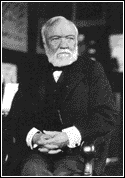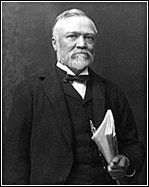|
| ||
|
Born in Dunfermline, Scotland, on November 25, 1835, Andrew Carnegie was to become the richest human being of his time and one of history's greatest philanthropists. The son of Margaret and Will Carnegie, Andrew moved to America with the rest of his family when, in 1847, steam-powered looms were introduced in Dunfermline, Scotland, leaving hundreds of workers, as well as Andrew's father (a weaver), unemployed. The Carnegie family settled in Pittsburgh, where Andrew worked many different jobs, starting as a bobbin  boy in a textile mill, later working as a clerk and a telegraph operator.
After his father's death in 1855, Andrew took out a bank loan to invest in
Woodruff Sleeping Car Company, and after two years he began to get a return
of about $5000/year, more than three times his salary.
boy in a textile mill, later working as a clerk and a telegraph operator.
After his father's death in 1855, Andrew took out a bank loan to invest in
Woodruff Sleeping Car Company, and after two years he began to get a return
of about $5000/year, more than three times his salary.
He also began his literary career during his youth, through letters written to the Pittsburgh Dispatch protesting the fact that he was unable to receive a free membership to Col. James Anderson's "Mechanics' and Apprentices'" Library. He did win this early battle and it helped further his convictions that information equalled power and that free libraries should be available to everyone. Carnegie then moved through a rapid succession of jobs with Western Union and the Pennsylvania Railroad, resigning in 1865 to establish his own business ventures, including the Carnegie Steel Company, which launched the steel industry in Pittsburgh. Then, in 1901 (when Carnegie was 65), he sold the company to J.P. Morgan to buy him out for $480 million, making him the richest man alive. From that point on, Carnegie devoted his life to his philanthropic activities and writing, including his autobiography.
After the sale of Carnegie Steel, Andrew demonstrated his belief that the rich should give their fortune to the community, making the first of many large gifts to his hometown of Dunfermline, Scotland. By far his greatest legacy would have to be the hundreds of libraries that he made possible, including The Carnegie Library of Pittsburgh, which is close to a hundred years old. This library contains his own words inscribed over the door: "Free to the People." By the time he died in 1919 (in Lenox, Massachusetts, 11 August), he had given away $350,695,653, and the last $30,000,000 was given away to various charities after his death. Both Andrew Carnegie's life and death can be said to have followed his philosophy that "The man who dies thus rich, dies disgraced." | ||
|
| ||
Thursday, December 26th, 2019
Attention visitors: Tartans.com is back. Please note that this is a snapshot of the site as it existed nearly 20 years ago and you may encounter broken links; we are still combing through the site and correcting those as we find them. Please also note that some sections are currently not functional, primarily the discussion forums/clan chat boards.
|
** HOME - First Time Visitors - Glossary - - Contact Us ** Awards | Bibliography | Clan Calendar | Clan Chat | Clan Finder | History | Famous Scots | Genealogy | Great Hall of the Clans | Links | News and Features | Scots on the Net | Search | Site Map The Gathering of the Clans
Copyright 1995- Tartans.com - All Rights Reserved. |

 Before selling his company, Carnegie pioneered many new concepts during his
time as the owner of Carnegie Steel Company. In 1886, he was one of the few
industrialists of the time to support labour unions, publishing an essay in
Forum Magazine defending the right of workers to organize into a union. In
1889, he published "The Gospel of Wealth," arguing that the wealthy have a
moral obligation to serve as stewards for society and give away their
fortunes. During this time, Carnegie still possessed a fondness for his
homeland, and after marrying Louise Whitfield in 1887, he searched for a
home in Scotland, eventually buying Skibo Castle for 85,000 pounds.
Before selling his company, Carnegie pioneered many new concepts during his
time as the owner of Carnegie Steel Company. In 1886, he was one of the few
industrialists of the time to support labour unions, publishing an essay in
Forum Magazine defending the right of workers to organize into a union. In
1889, he published "The Gospel of Wealth," arguing that the wealthy have a
moral obligation to serve as stewards for society and give away their
fortunes. During this time, Carnegie still possessed a fondness for his
homeland, and after marrying Louise Whitfield in 1887, he searched for a
home in Scotland, eventually buying Skibo Castle for 85,000 pounds.